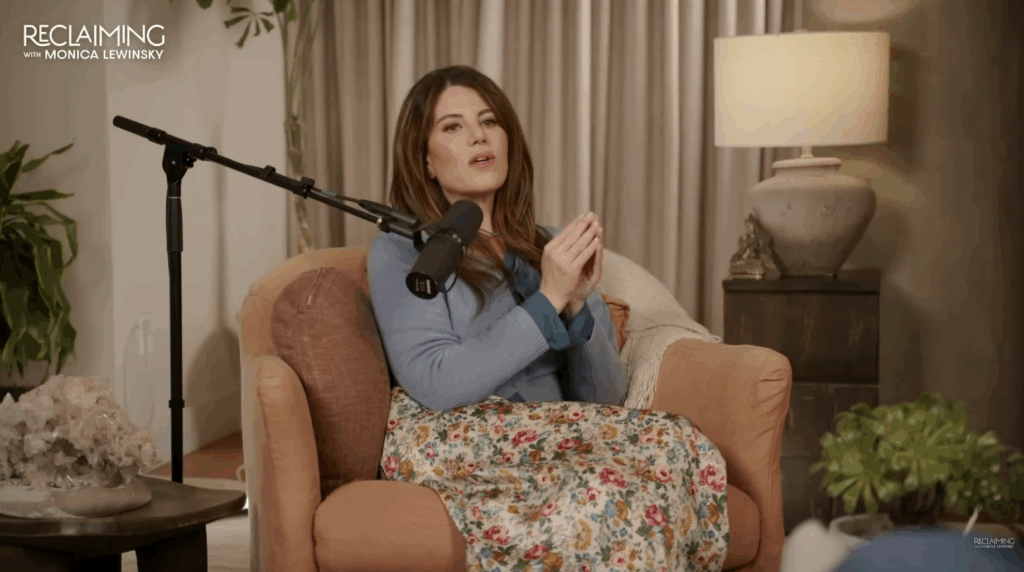


For her latest reinvention, the woman who nearly toppled a presidency is co-producing the new Hulu series The Twisted Tales of Amanda Knox. Knox was convicted of murder and served nearly four years in an Italian prison before her exoneration in 2015. NPR announced the venture with the headline: “Amanda Knox joins forces with Monica Lewinsky to bring her story to television.”
They got the lede backwards. It seems Lewinsky approached Knox after learning that Knox “wanted to adapt her memoir for the screen.” Lewinsky apparently sensed a kinship and yet another opportunity in the limelight.
Earlier this year, she launched a podcast called Reclaiming with Monica Lewinsky. The show purports to explore what it means to “reclaim what’s been lost or taken” from self-described victims, including Miley Cyrus, Chelsea Handler, Savannah Guthrie, and other celebrities.
Last year, Lewinsky became the face of a fashion brand. Ten years ago, it was a spread in Vanity Fair and a wildly popular TED Talk entitled “The Price of Shame.” Both served as launching pads for her mission to rid the world of cyberbullying. She has also appeared on HBO, designed handbags, hosted a reality show, and commanded Barbara Walters’ attention.
Interviewed about their relationship, Knox characterized Lewinsky as a woman “who has gone through her own version of hell.” This comparison between the two fails. Knox was convicted and imprisoned for a crime she didn’t commit.
Lewinsky never uttered the words, “I’m sorry” during her TED Talk. “Shame is an industry,” Lewinsky said. “Not a day goes by that I’m not reminded of my mistake.” Not a day goes by that victims of infidelity aren’t reminded of their broken families or the aftershocks they endure. Although she expressed “regret” for her “mistake” and has since contended she has apologized to multiple people and would even do so to Hillary Clinton again, Lewinsky’s constant, obvious attempts to recast herself in the role of victim are an affront to real victims, especially those struggling to reclaim their lives after spousal infidelity.
Sure, cyberbullying, including toward Lewinsky, is wrong. Sure, people with remorse deserve second chances. As reactions to the recent Coldplay kiss-cam incident highlight, public outrage over infidelity is misplaced, and we can do better to support victims and hold perpetrators accountable. (For the record, nobody is letting ex-President Clinton off the hook.) But Lewinsky’s endeavors will never convince true victims she’s paid anywhere near the price they have.
Infidelity places major stress on marriages and constitutes a leading cause of divorce. Research suggests that 13 percent of ever-married American adults between 25 and 54 had sexual relations with “someone other than their spouse while married.” Although this number declined by four percent between 1991 and 2022, it is still significant.
The financial toll is crushing. The emotional toll is devastating. Victims of infidelity can suffer trauma that manifests in numerous ways, including anger, guilt, jealousy, and more. Infidelity has also been linked to fear of abandonment and inability to form other relationships. Not to mention the overwhelming amount of research demonstrating how divorce negatively affects the children of parents who split.
Sometimes the pain is so acute it leads to aggressive behavior like that of Clara Harris, who was sent to jail after running over her husband. She snapped when she found him with his receptionist in the very same hotel where Harris and her husband reportedly honeymooned.
Lewinsky stepped out of the spotlight while getting her master’s degree at the London School of Economics. After graduating in 2006, she explained in Rolling Stone earlier this year, she “desperately wanted to become a private person again,” but couldn’t find employment — again, casting herself in the role of victim.
Women affected by divorce undoubtedly struggle in the workforce, too, as women are already “overrepresented” in lower-paying jobs, likely with few advancement opportunities, and are more often caregivers for children.
After my ex-husband’s betrayal, I looked for employment about the same time as Lewinsky. Instead of plum gigs, I temped at all hours, became a landlord, and packed, mailed, and hauled boxes in a warehouse. I’d once been a high-powered lawyer working at some of the most prestigious law firms. Did Lewinsky apply to wait tables or wash dishes? (Thankfully, I had a house to sell to start over, although I still couldn’t afford to stay in my hometown.)
Lewinsky indicates she’s no longer “allergic” to the plight of victims like Knox. But is she open to betrayed spouses, who have fewer degrees of separation? Is she willing to use her platform to give victims of infidelity and family law injustice a much-needed voice? Lewinsky keeps bouncing from project to project, seemingly unable to find her path to redemption. Maybe she is going about recovery all wrong.
A woman who is willing to embrace her true narrative and acknowledge the pain and damage she and those like her have caused is the kind of woman that women like me could not only forgive, but perhaps even respect.
